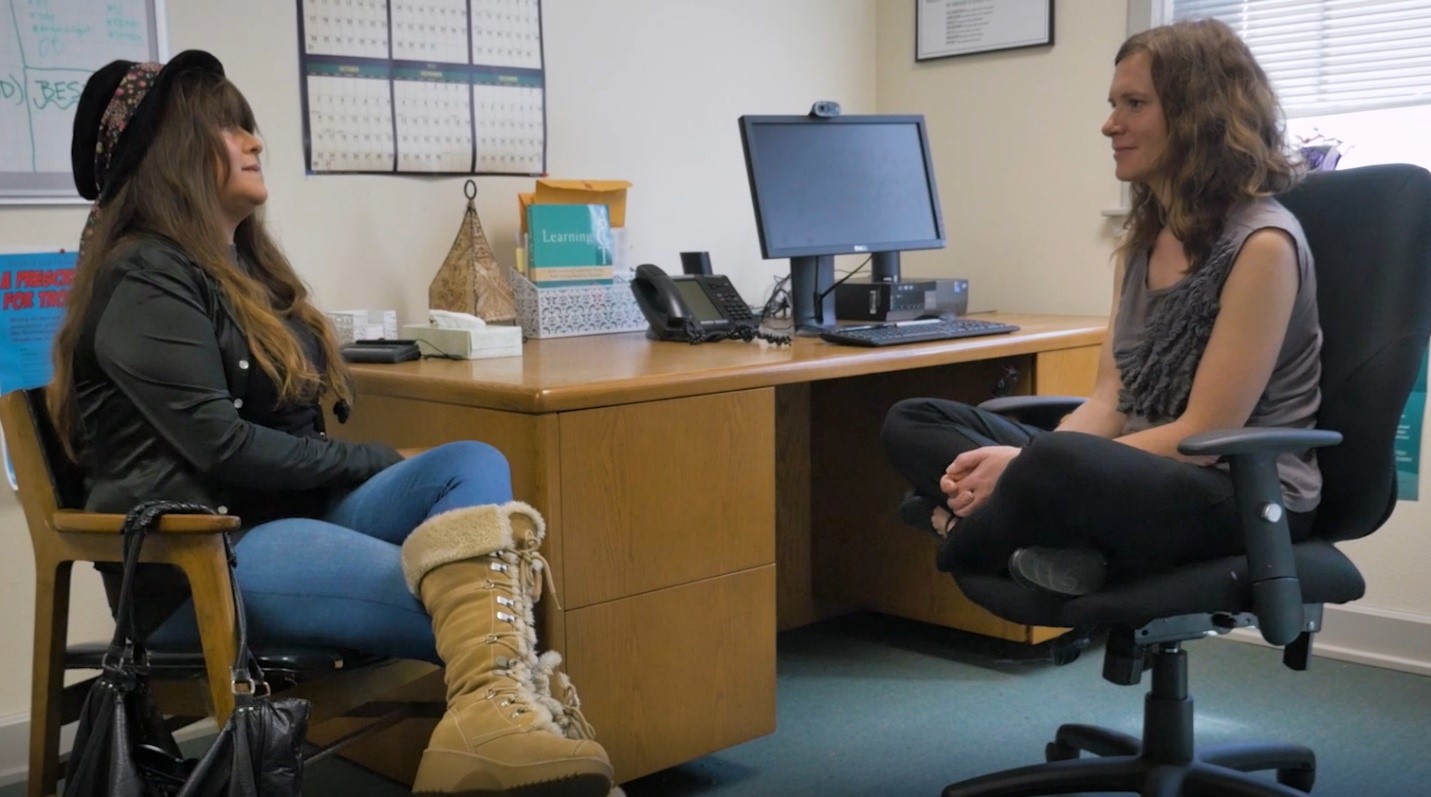
 While pursuing her undergraduate degree in psychology at the University of Washington in 1999, Michelle Peavy was introduced to Molly Carney, who was conducting research at the UW’s Alcohol and Drug Abuse Institute (ADAI). She worked with Molly – now the executive director at ETS – on projects looking at substance use disorder treatment outcomes. Those early research projects set Michelle on a path that led to ETS working at the intersection of treatment and research. We met up with Michelle in her office to ask a few questions about the research that ETS participates in, and how it improves the lives of patients and their communities.
While pursuing her undergraduate degree in psychology at the University of Washington in 1999, Michelle Peavy was introduced to Molly Carney, who was conducting research at the UW’s Alcohol and Drug Abuse Institute (ADAI). She worked with Molly – now the executive director at ETS – on projects looking at substance use disorder treatment outcomes. Those early research projects set Michelle on a path that led to ETS working at the intersection of treatment and research. We met up with Michelle in her office to ask a few questions about the research that ETS participates in, and how it improves the lives of patients and their communities.
ETS: Michelle, how long have you been working at Evergreen Treatment Services and what’s your role?
Michelle: I’ve been employed at ETS for five years and am currently the research and training manager, though I am trained as a clinical psychologist. My title has gone through many iterations at ETS, starting when I worked as a summer volunteer at the front desk during my undergrad years. That was a formative experience because I got to meet the people ETS serves every day; I learned so much about medication-assisted treatment that way. My professional path intersected with ETS at various points, and I always considered it a “professional home.” In my current role, I feel fortunate to exercise my skills and training as both a clinician and a scientist.
ETS is and has always been very involved in research on substance use disorder treatment options and methods. What is the goal of this work?
The goal is pretty simple: we want to provide our patients, and people with substance use disorders all over the world, with the most effective treatment options possible to improve their lives. Research helps us better understand what works.
In addition, decades of efficacy research have been dedicated to the treatment we offer at ETS – medication-assisted treatment. We now know that this is the most effective treatment for opioid use disorders. We owe a debt to science and want to conduct further research to improve patient outcomes.
In what ways has the research conducted at ETS improved outcomes for patients?
We’ve been home to dozens of research studies over the course of our 44-year history. I’ve only been here for a few of those years, so I won’t be able to fully answer that question, but I can tell you about one study that has provided patients with critical access to healthcare.
Together with Dr. Judy Tsui, a Harborview Medical Center primary care doctor who provides services at ETS, we’re involved in a national study supporting access to Hepatitis C treatment for people who inject drugs. The idea behind the study, called the HERO (HEpatitis Real Options) Study, is that we have an effective medication that can cure Hepatitis C. The problem is that this medication is expensive, and people who inject drugs may not be prioritized for treatment. Furthermore, it’s imperative that patients follow the treatment steps closely, which is difficult. The medication must be taken once daily over the course of 2-3 months to be effective.
The HERO Study is comparing different ways for patients to receive their medications, like patients obtaining and taking the meds during an observed ETS visit. We believe we’re the perfect venue for treatment because people come daily to receive their medication for opioid use disorder. Adding a second medication for those who need it would be relatively easy to administer and observe since it’s what our system is already set up to do.
Our involvement in this research makes better treatment available to patients who might not qualify for free treatment because of their status as an IV drug user. Because of this study, seven patients have been fully cured of Hep C, with more cures on the horizon. Without the research, this wouldn’t be possible.
It’s really a win-win; patients get access to additional treatment and they can give back to the scientific community. Many of our patients jump at the opportunity to be involved. They’re an incredibly altruistic group of people who put many of us to shame with their earnest desire to contribute.
Does research improve your work? Or the work of your colleagues?
Research results can help us determine which interventions are best suited for patients, and provide training and resources for clinic staff. For example, with our ADAI partners Drs. Mary Hatch-Maillette and Betsy Wells, we are testing a behavioral intervention targeting risky sexual behaviors. The idea is to cut down on patients’ risk of abuse or contracting sexually transmitted infections. But sex can be a difficult subject for patients and counselors to discuss openly with lots of stigma and shame attached to it. This research study, called BEST (BEing Safe in Treatment), provides training for counselors to improve communication about this issue, which has the potential to reduce risky behavior.
When we learn more about how to address these difficult issues and test different approaches, that knowledge stays at ETS even when the research is over. The counselors who are involved in BEST are now better equipped to discuss risky sexual behaviors with the clients they serve. Similarly, the patients who are involved not only get compensated for their time, they also get the opportunity to benefit from a more open discussion.
Can you give an example of an important research topic ETS has been involved in that was driven by news media a high-profile public debate?
Definitely. Opioid overdose deaths began getting a lot of press a number of years ago and there has been particular media focus on the effectiveness of Naloxone – an overdose antidote. Back in 2014 we were one site that tested an overdose prevention intervention, the OOPEN study, conducted by UW ADAI’s Dr. Caleb Banta-Green. More than 200 patients were enrolled in the study, and half of them were randomized to receive overdose prevention training and Naloxone kits.
This study has been an incredibly impactful and valuable experience for ETS: distribution of Naloxone kits and the prevention training are now part of our treatment, and patients who undergo the training report feeling empowered to save the lives of others. Our contribution has led to the development of what we consider to be the online overdose resource – stopoverdose.org.
What research are you most excited about right now?
I’m excited about research we’re doing with Dr. Dave Atkins, Research Professor in UW’s Department of Psychiatry and Behavioral Sciences. Dr. Atkins and his collaborators are working on technologies to support and improve counseling. It’s very different than previous studies because instead of testing an intervention we are co-developing a software tool that is both being designed and tested at ETS. The long-term vision is to use it in a variety of behavioral health settings. The team developing this product is truly interdisciplinary in nature, and it’s unique for me to collaborate with clinical psychologists, speech engineers, design professionals, programmers, computational linguists, and others.
The work at ETS will test how this technology can be improved for substance use disorder counselors, and how to implement it at sites like ours. Questions that the larger research team is looking at are, “What is it in language that helps people change?” or “What does it sound like to have a connection between client and therapist?” At the very least, the beta product will allow counseling session recording for review with a supervisor and a few other perks like the ability to assess the balance of speakers – how much the counselor talks compared to the patient. They’re also looking at how the language used by counselors motivates patients – or not.
Besides just being fascinated by these types of questions, a practical outcome could be a service that helps counselors with their reporting workload. Our ETS counseling staff see so many patients each day that the burden of paperwork is sometimes overwhelming. It would be helpful if a smart service like this could make reporting easier so we could spend more time with patients.
Ok, we have time for one last question. What is one thing that people do not seem to understand about opioid use disorders that you want them to know?
Great question. Research is all about finding patterns, which is incredibly important to help us understand groups of people (like those with opioid use disorder) and how to best help them. However, the most compelling part of my job is understanding people on an individual basis: hearing about their lives, and really knowing their independent struggles. I guess what I want people to understand is that each person with an opioid use disorder has a unique and interesting experience. If people could take the time to hear one of their stories of heartache, courage, and resiliency, I believe there would be more compassion and less stigma, which is really what this group of people needs most.





One response to “In Conversation with Michelle Peavy”